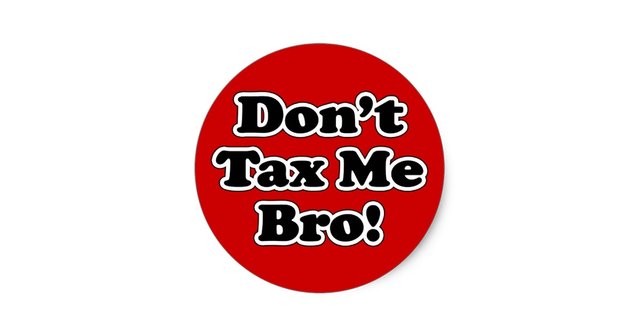Why Taxation Makes Us Poorer
There’s little space here to contend that taxation is morally indefensible, though I’d argue it’s patently coercive and that the State rests upon aggression, and no sort of voluntary “social contract.” I want to instead try and illustrate the value-free, economic effects of taxation; hopefully which can be demonstrated quite quickly to be indisputable. Mainstream economics textbooks in the government-schools do not teach the effects of taxation, but mention it as a given, a “necessary evil”, or worst even, of positive benefit to the economy.
Firstly, there are only two ways of obtaining wealth. There is: (1) original appropriation, i.e., homesteading (a principle in libertarianism; and one because it can be universalized and applied to everyone) or contracting via trade, what might be called the “economic means”; or by (2) exploitation, i.e., the expropriation of original appropriators by non-contractors of such property, or what might be called the “political means” or theft. Indeed the history of the world might be viewed in this light: of exploiters and the exploited; of non-producers and producers; of slavery vs. freedom.
So what might sound trivial is necessary to point out: all taxation is a tax on production. Without the preceding value-creation brought about by someone, there would be nothing to tax. Taxation is then a [coercive] transfer of property from producers and original-contractors of such property to non-producers and non-contractors of said property.
There’s no wealth generated in this process; there is only redistribution, and with it, an increased consumption of the existing pool of wealth. The government produces nothing; its “products” are taxation, regulations, war, and other absurdities that destroy the formation of capital that is so imperative to future prosperity.
As a result, taxation raises the opportunity costs of engaging in wealth-producing activities, i.e., of “work”, while simultaneously decreasing the cost of consuming wealth, i.e., of becoming a recipient of such redistributed property. It also encourages people (including businessmen, bankers, and industrialists) to turn to the political means of wealth acquisition (of subsidies and legal privileges), which is that of stealing from producers.
At some point, some people realize it’s no longer worth their time and effort to work, but rather it would be just as rewarding to collect some form a welfare (e.g. an unemployment check, food stamps, health care, other loot); making too much might make them ineligible for the free ride. Henry Hazlitt puts this basic truth as a chapter title in his Economics in One Lesson, a classic on common-sense and in economic logic: “Taxation discourages production.”
Taxation, though, affects relative production, and for this reason it’s possible that an economy can still grow under socialism, i.e., taxation; this growth however will just be less than it could have been without the taxes. Economies thus expand their output in spite of taxation, and certainly not because of it. We would be many times richer were it not for this. One must only imagine superimposing today’s regulatory-tax-state on primitive society (or even minimum wage laws on poor countries today) to see that man would have never overcome such hurdles to production to get to where we are now.
While the theory here is good and sound, empirically we may even point out real-world examples that would explain the relative wealth of nations. For example, the relative wealth (and a lesser degree of socialism) of America to Europe; or West Germany to East Germany; or the growth of the Western world in the 19th Century as compared to entry of the welfare-warfare-state into the early 20th Century.
Of last mention, if such prohibitive taxation encourages barter over the exchange for money or decreases ones incentive to undergo production for money, and the demand for money falls as a result, then this is only to say that the purchasing power of money has declined and thus with it the standard of living for everyone in the economic system. Money, after all, helps to make possible the division of labor and the increasing of value for everyone's product.
Most might concede this point here of relative impoverishment, yet justifying this reduction in overall wealth by supposedly making up for it in that we’re at least “more equal” as a result, although this isn’t true either. The degree of prosperity, as measured in terms of goods and services produced in the economy, can be explained by the degree of taxation or lack thereof; or, that is, of the degree of socialism, as conceived of as the invasion of property rights by the State.
Its effects are also not limited to economic or ethical, either; sociologically, it breeds resentment between the stolen-from and the thieves or recipients, raises a culture of non-producers, disincentivizes increasing one’s talents if one’s income is no longer dependent upon doing so, and many other problems. Taxation absolutely makes any society poorer, not richer. “We” should abolish it.
